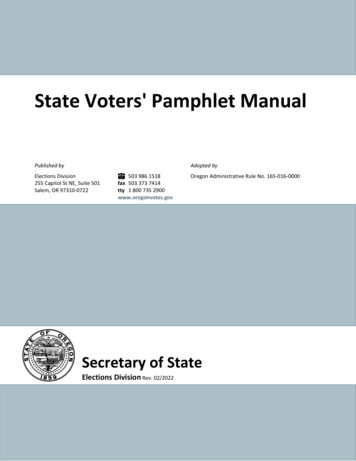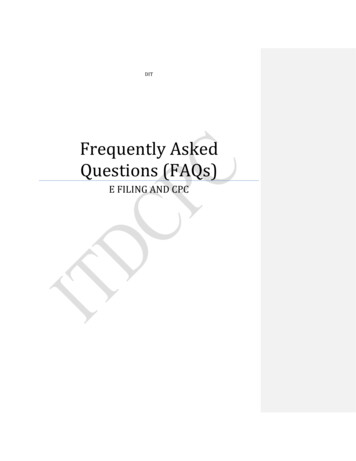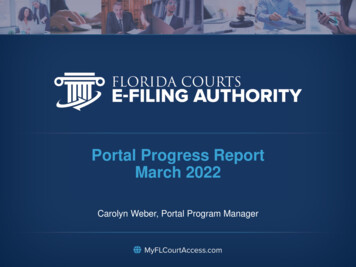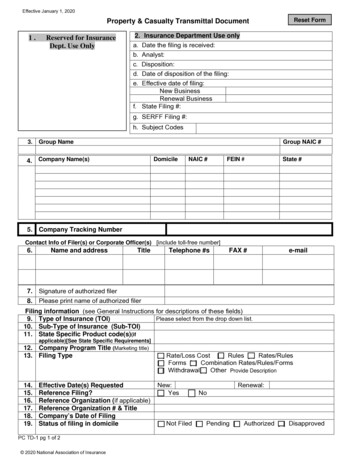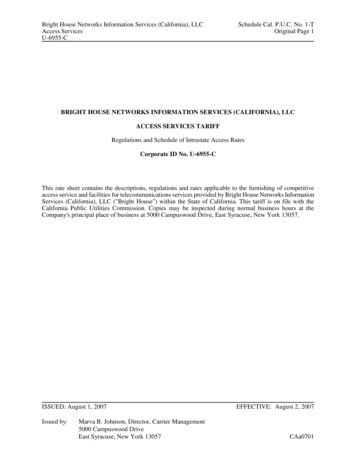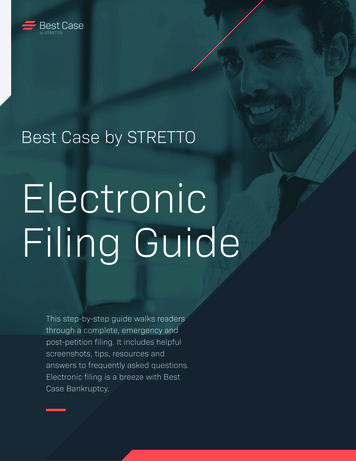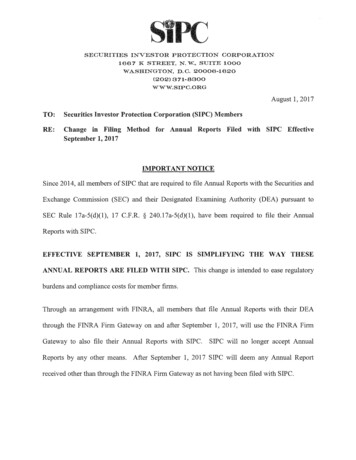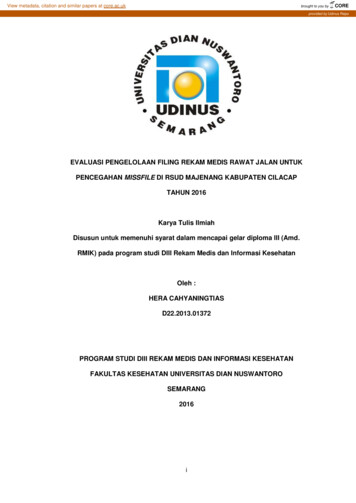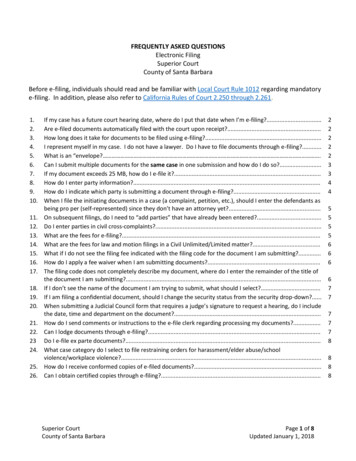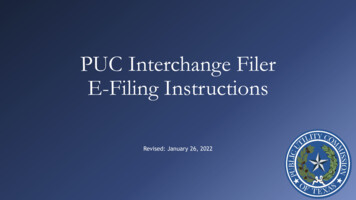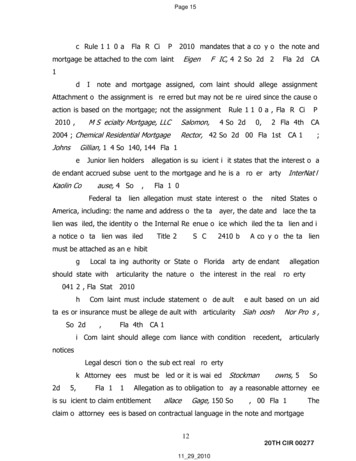
Transcription
Page 15(c) Rule 1.130(a), Fla. R. Civ. P. (2010) mandates that a copy of the note andEigen v. FDIC, 492 So. 2d 826 (Fla. 2d DCAmortgage be attached to the complaint.1986).(d) If note and mortgage assigned, complaint should allege assignment.Attachment of the assignment is preferred but may not be required since the cause ofaction is based on the mortgage; not the assignment. Rule 1.130(a), Fla. R. Civ. P.(2010),WM Specialty Mortgage, LLC v. Salomon, 874 So. 2d 680, 682 (Fla. 4th DCA2004); Chemical Residential Mortgage v. Rector, 742 So. 2d 300 (Fla. 1st DCA 1998);Johns v. Gillian, 184 So. 140, 144 (Fla. 1938).(e) Junior lien holders - allegation is sufficient if it states that the interest of adefendant accrued subsequent to the mortgage and he is a proper party. InterNat’l.Kaolin Co. v. Vause, 46 So. 3, 7 (Fla. 1908).(f)Federal tax lien allegation must state interest of the United States ofAmerica, including: the name and address of the taxpayer, the date and place the taxlien was filed, the identity of the Internal Revenue office which filed the tax lien and ifa notice of tax lien was filed.Title 28 U. S. C. § 2410(b). A copy of the tax lienmust be attached as an exhibit.(g)Local taxing authority or State of Florida party defendant - allegationshould state with particularity the nature of the interest in the real property.§69.041(2), Fla. Stat. (2010).(h)Complaint must include statement of default. Default based on unpaidtaxes or insurance must be allege default with particularity. Siahpoosh v. Nor Props.,666 So. 2d 988, 989 (Fla. 4th DCA 1996).(i) Complaint should allege compliance with condition precedent, particularlynotices.(j) Legal description of the subject real property.(k) Attorney fees - must be pled or it is waived. Stockman v. Downs, 573 So.2d 835, 838 (Fla. 1991). Allegation as to obligation to pay a reasonable attorney feeis sufficient to claim entitlement. Wallace v. Gage, 150 So. 799, 800 (Fla. 1933). Theclaim of attorney fees is based on contractual language in the note and mortgage.1211 29 201020TH CIR 00277
Page 16(l)Additional counts include: reestablishment of the note and reformation.Reestablishment of the note is necessary if the note is lost; reformation of the note isneeded if material terms are missing. Reformation of the mortgage applies if there isa legal description discrepancy; reformation of deed is there is a deed problem.(m) Deficiency judgment – if plaintiff seeks a deficiency, the guarantors mustbe sued.Original Document Filing and Reestablishment of the Note1.Note - Lender is required to either present the original promissory note or givea satisfactory explanation for the lender’s failure to present it prior to it beingenforced. Nat’l. Loan Investors, L.P. v. Joymar Associates, 767 So. 2d 549, 550 (Fla.3d DCA 2000).(a) A limited exception applies to lost, destroyed or stolen instruments. Id.2.A lost promissory note is a negotiable instrument. § 673.1041(1), Fla. Stat.(2008); Thompson v. First Union Bank, 643 So. 2d 1179 (Fla. 5th DCA 1994).(a) Loss or unintentional destruction of a note does not affect its validity orenforcement.3.Reestablishment of the lost note - An owner of a lost, stolen or destroyedinstrument may maintain an action by showing proof of his ownership, facts thatprevent the owner from producing the instrument and proof of the terms of the lostinstrument. § 673.3091(2), Fla. Stat. (2004); Lawyer’s Title Ins. Co., Inc. v. NovastarMortgage, Inc., 862 So. 2d 793, 798 (Fla. 4th DCA 2004); Gutierrez v. Bermudez, 540So. 2d 888, 890 (Fla. 5th DCA 1989).(a) Owner of note is not required to have held possession of the note when theloss occurred to maintain an action against the mortgagor. Deaktor v. Menendez, 830So. 2d 124, 126 (Fla. 3d DCA 2002). Further, plaintiff is not required to prove thecircumstances of the loss or destruction of the note to seek enforcement. Id., at 127.Plaintiff must show only that it was entitled to enforce the note at the time of loss orthat it has directly or indirectly acquired ownership of the instrument from a personwho was entitled to enforce the instrument when loss of possession occurred.1311 29 201020TH CIR 00278
Page 17§ 673.3091(1)(a), Fla. Stat. (2010); MERS v. Badra, 991 So. 2d 1037, 1039 (Fla. 4thDCA 2008).(b) If plaintiff is not in possession of the original note and did not reestablish it,plaintiff cannot foreclose on the note and mortgage. § 673.3091(1), Fla. Stat. (2004);Dasma Invest., LLC v. Realty Associates Fund III, L.P. 459 F. Supp. 2d 1294, 1302(S.D. Fla. 2006).(c) The filing of a duplicate copy of the note is sufficient to satisfy statutoryrequirements in a foreclosure action. Perry v. Fairbanks Capital Corp., 888 So. 2d 725(Fla. 5th DCA 2004). If there is no copy, Plaintiff should file a lost note affidavit,ledger or a summary of loan terms.(1) Checklist for lost note affidavit:(a) original principal balance;(b) signators and date note executed;(c) rate of interest;(d) unpaid balance and default date;(e) affiant status must be banking representative withknowledge of the particular loan;(f) indemnity language, precluding subsequent foreclosurejudgment on the same note.(d) Where the original note is lost, the court may require indemnification ofthe borrower for subsequent prosecution on the note and may require a bond tosecure same. Lovingood v. Butler Construction Co., 131 So. 126, 135 (Fla. 1930).Consider bonds particularly where there is a securitized trust.1.Mortgage – Copy of mortgage is sufficient. Perry, 888 So. 2d at 726.(a) Mortgage must contain correct legal description. Lucas v. Barnett Bank ofLee County, 705 So. 2d 115, 116 (Fla. 2d DCA 1998). If not, final judgment must beset aside. However, this can be corrected prior to final judgment.1411 29 201020TH CIR 00279
Page 18Fair Debt Collection Practices Act (FDCPA)1.Purpose - eliminate abusive debt collection practices by debt collectors and topromote consistent State action to protect consumers against debt collection abuses.”15 U.S.C. § 1692(e).2.Some Florida courts held - attorneys engaged in regular foreclosure work metthe general definition of debt collector and are subject to the FDCPA.Sandlin v.Shapiro, 919 F. Supp. 1564, 1567 (M.D. Fla. 1996), (law firm engaged in collectionforeclosure work was considered a debt collector where the firm sent correspondenceadvising of payoff and reinstatement figures and directed mortgagors to pay the lawfirm).3.Under FDCPA, a debt collector’s obligation to send a Notice of Debt is triggeredby an initial communication with the consumer. McKnight v. Benitez, 176 F. Supp.1301, 1304 (M.D. Fla. 2001).(a) Filing of suit is not “an initial communication which otherwise would havegiven rise to notice and verification rights.” Acosta v. Campbell,2006 WL 3804729(M.D. Fla. 2006).(b) Foreclosure law firms have adopted the practice of attaching to theircomplaint: “Notice Required under the Fair Debt Collection Practice Act.” This noticeheld ineffective in Martinez v. Law Offices of David J. Stern, 266 B.R. 523 (Bank. S.D.Fla. 2001).Mandatory Mediation of Homestead Foreclosures1.Based on the exponential increase in filings of mortgage foreclosure cases inthe Eleventh Judicial Circuit Court, the Chief Judge implemented four AdministrativeOrders in the following sequence:(a) Administrative Order 09-08 applies to all residential foreclosure actionsinvolving homestead properties filed on or after May 1, 2009. AO 09-08 establishedthe 11th Circuit Homestead Access to Mediation Program (CHAMP) mandatingmandatory mediation of homestead foreclosures prior to the matter being set for finalhearing. At the time of filing the complaint, Plaintiff is required to transmit to the1511 29 201020TH CIR 00280
Page 19Program Manager, the Collins Center, a notice form (Form A) with borrower’s contactinformation. Within five days of filing the complaint, Plaintiff must tender a cost checkin the amount of 750.00 to cover the administrative costs of the mediation. TheCollins Center responsibilities include: contacting the borrower, referring the borrowerto financial counseling and making financial documentation available electronically tothe Plaintiff. Plaintiff’s counsel and the borrower are required to be physically presentat mediation; the lender’s representative must attend, but is allowed to participate bytelephone. Within ten days of the completion of the mediation, the mediator mustreport the mediation results to the court.(b)Administrative Order 09-09 revised the following forms: the civil coversheet, Plaintiff’s certification of settlement authority, Plaintiff’s certification ofresidential mortgage foreclosure case status and the final judgment of foreclosure.This Administrative Order specifically exempts condominium and homeowners’association fee foreclosures, private investor mortgage foreclosures, foreclosures ofnon-homestead properties and construction lien foreclosures.(c) Administrative Order 09-09 A1 acknowledged the statutory authority of theClerk of the Courts to conduct the sale of real or personal property by electronicmeans. This Administrative Order further proscribed adherence to certain proceduresconcerning tenant occupied residential properties under the “Protecting Tenants atForeclosure Act of 2009.”Amending the specific format of the final judgment offoreclosure, this Administrative Order prohibited the issuance of immediate writs ofpossession.(d)Administrative Order 09-18 responded to the Clerk of the Court’s requestfor formal approval to conduct on-line auctions, in lieu of on-site auctions for the saleof real property.2.On December 28, 2009, the Florida Supreme Court issued Administrative Order09-54, adopting the recommendations of the Task Force on Residential MortgageForeclosure Cases and establishing a uniform, statewide managed mediation program.The Florida Supreme Court approved the Task Force’s Model Administrative Order,with minor changes to be implemented by each circuit chief judge.1611 29 201020TH CIR 00281
Page 203.On February 26, 2010, the Eleventh Judicial Circuit Court issued AdministrativeOrder 10-03 A1 requiring mandatory mediation of all homestead mortgage foreclosureactions subject to the federal Truth in Lending Act, Regulation Z.AdministrativeOrder 10-03 A 1 applies to actions filed after March 29, 2010. Specifically exemptedfrom this Administrative Order are condominium and homeowners’ association feeforeclosures and mechanics and construction lien foreclosures. This AdministrativeOrder constitutes a formal referral to mediation through the Residential MortgageForeclosure Mediation (RMFM) Program; parties are ineligible for default judgment, asummary judgment or final hearing until they have fully complied with mediationrequirements.Basic Procedural Requirements of Administrative Order 10-03 A1 include:(a) When suit is filed, plaintiff must file a completed Form A with the Clerklisting the last known mailing address and phone number for each party.Onebusiness day after filing the complaint, plaintiff must transmit Form A to the ProgramManager of the RMFM along with the case number of the action. The Collins Centerfor Public Policy, Inc. is the contract Program Manager in the Eleventh Judicial Circuit.At the time of the filing of the complaint, the Plaintiff must tender RMFM fees in theamount of 400.00; the balance of fees in the amount of 350.00 must be paid byPlaintiff within 10 days after notice of the mediation conference.(b)Upon receipt of Form A, the Program Manager must contact the borrowerand refer the borrower an approved mortgage foreclosure counselor.Foreclosurecounseling must be completed no later than 30 days from the Program Manager’sinitial contact with the borrower.If the Program Manager is unable to contact theborrower within this time frame, the borrower will have been deemed to electnonparticipation in the RMFM Program.(c)The Program Manager must transmit the borrower’s financial disclosurefor mediation no later than 60 days after the Program Manager receives Form A fromPlaintiff.(d)The Program Manager shall schedule a mediation session no earlier than60 days and no later than 120 days after suit is filed.1711 29 201020TH CIR 00282
Page 21(e)Plaintiff’s representative may appear by telephone upon 5 days noticeprior to the mediation; plaintiff’s attorney, the borrower and the borrower’s attorney,if any, must attend in person.The court may dismiss the action without prejudice orimpose other sanctions for failure to attend.Within 10 days after completion ofmediation, the mediator must issue a report advising the court as to the parties’attendance and result.Service of Process1.Due service of process is essential to satisfy jurisdictional requirements overthe subject matter and the parties in a foreclosure action. Rule 1.070, Fla. R. of Civ.P. (2010) and Chapters 48 and 49 of the Florida Statutes.2.Service of process must be made upon the defendant within 120 days after thefiling of the initial pleading. Rule 1.070(j), Fla. R. Civ. P. (2010). Absent a showing ofexcusable neglect or good cause, the failure to comply with the time limitations mayresult in the court’s dismissal of the action without prejudice or the dropping of thedefendant.Personal Service1.Section 48.031 (1), Fla. Stat. (2010) requires that service of process beeffectuated by a certified process server on the person to be served by delivery of thecomplaint or other pleadings at the usual place of abode or by leaving the copies atthe individual’s place of abode with any person residing there, who is 15 years of ageor older and informing them of the contents. § 48.27, Fla. Stat. (2010).(a) Ineffective service - Leaving service of process with a doorman or with atenant, when the defendant does not reside in the apartment is defective service.Grosheim v. Greenpoint Mortgage Funding, Inc., 819 So. 2d 906, 907 (Fla. 4th DCA2002).Evidence that person resides at a different address from service address isineffective service. Alvarez v. State Farm Mut. Ins. Co., 635 So. 2d 131 (Fla. 3d DCA1994).(b) Judgment subject to collateral attack where plaintiff did not substantiallycomply with the statutory requirements of service.1811 29 201020TH CIR 00283
Page 222.Substitute service authorized by Section 48.031 (2), Fla. Stat. (2010).Substitute service may be made upon the spouse of a person to be served, if thecause of action is not an adversary proceeding between the spouse and the person tobe served, and if the spouse resides with the person to be served.(a) Statutes governing service of process are strictly construed. General deSeguros, S.A. v. Consol. Prop. & Cas. Ins. Co., 776 So. 2d 990, 991 (Fla. 3d DCA2001). (reversed with directions to vacate default judgment and quash service ofprocess since substituted service was not perfected).(b) Use of private couriers or Federal Express held invalid. Id.; FNMA v.Fandino, 751 So. 2d 752, 753 (Fla. 3d DCA 2000), (trial courts voiding of judgmentaffirmed based on plaintiff’s failure to strictly comply with substitute service of processwhich employed Fedex).(c)Evading service of process – defined by statute as concealment ofwhereabouts. § 48.161(1), Fla. Stat. (2010); Bodden v. Young, 422 So. 2d 1055 (Fla.4th DCA 1982).(1)The Florida case which clearly illustrates concealment is Luckey v.Smathers & Thompson, 343 So. 2d 53 (Fla. 3d DCA 1977). In Luckey, thedefendant had "for the purpose of avoiding all legal matters, secretedhimself from the world and lived in isolation in a high security apartmentrefusing to answer the telephone or even to open his mail." Id. at 54. TheThird District Court of Appeal affirmed the trial court's decision denyingdefendant's motion to vacate the writ of execution and levy of sale based on arecord of genuine attempts to serve the defendant. The Third District Courtfurther opined that "there is no rule of law which requires that the officers ofthe court be able to breach the self-imposed isolation in order to inform thedefendant that a suit has been filed against him.” Id.(2) Effective proof of evading service must demonstrate plaintiff’sattempts inlight of the facts of the case (despite process server’s 13 unsuccessful attemptsat service, evasion was not proved based on evidence that the property wasoccupied and defendant’s vehicle parked there.) Wise v. Warner, 932 So. 2d1911 29 201020TH CIR 00284
Page 23591, 592 (Fla. 5th DCA 2006).Working whose place of employment wasknown to the sheriff was not concealing herself or avoiding process, sheriffonly attempted service at the residence during work hours. Styles v. UnitedFid. & Guaranty Co., 423 So. 2d 604 (Fla. 3d DCA 1982).(3) Statutory requirements satisfied if papers left at a place from which theperson to be served can easily retrieve them and if the process servertakes reasonable steps to call the delivery to the attention of the person to beserved. Olin Corp. v. Haney, 245 So. 2d 669 (Fla 4th DCA 1971).3.Service on a corporation - may be served on the registered agent, officer ordirector.Section 48.081(2)(b), Fla. Stat. (2010) - if the address provided for theregistered agent, officer, director, or principal place of business is a residence orprivate mailbox, service on the corporation may be made by serving the registeredagent, officer or director in accordance with § 48.031, Fla. Stat. (2010).Constructive Service by Publication1.Section 49.011(1), Fla. Stat. (2010) identifies the enforcement of a claim of liento any title or interest in real property such as foreclosure actions.2.Sections 49.021-40.041, of the Florida Statutes govern constructive service orservice by publication. Constructive service statutes are strictly construed against theparty seeking to obtain service. Levenson v. McCarty, 877 So. 2d 818, 819 (Fla. 4thDCA 2004).3.Service by publication - only available when personal service cannot be made.Godsell v. United Guaranty Residential Insurance, 923 So. 2d 1209, 1212 (Fla. 5thDCA 2006), (service by publication is void when plaintiff knew of the defendant’sCanadian residency, but merely performed a skip trace in Florida and made no diligentsearch and inquiry to locate Canadian address);Gross v. Fidelity Fed. Sav. Bank ofFla., 579 So. 2d 846, 847 (Fla. 4th DCA 1991), (appellate court reversed andremanded to quash service of process and default based on plaintiff’s knowledge ofdefendant’s out of state residence address and subsequent failure to attempt personalservice).2011 29 201020TH CIR 00285
Page 24(a) Plaintiff must demonstrate that an honest and conscientious effort,reasonably appropriate to the circumstances, was made to acquire the necessaryinformation and comply with the applicable statute. Dor Cha, Inc. v. Hollingsworth,8786 So. 2d 678, 679 (Fla. 4th DCA 2004), (default judgment reversed based onplaintiff’s crucial misspelling of defendant’s name and subsequent search on wrongindividual).(b) Condition precedent to service by publication - Section 49.041, Fla. Stat.,(2010), requires that the plaintiff file a sworn statement that shows (1) a diligentsearch and inquiry has been made to discover the name and residence of suchperson, (2) whether the defendant is over the age of 18, of if unknown, the statementshould set forth that it is unknown, and (3) the status of the defendant’s residence,whether unknown or in another state or country.Section 49.051, Fla. Stat. (2010)applies to service by publication on a corporation.(c) Plaintiff is entitled to have the clerk issue a notice of action subsequent tothe filing of its sworn statement. Pursuant to § 49.09, Fla. Stat., (2010), the noticerequires defendant to file defenses with the clerk and serve same upon the plaintiff’sattorney within 30 days after the first publication of the notice.(1) Notice - published once each week for two consecutive weeks,with proof of publication filed upon final publication.§49.10(1)(c)(2), Fla. Stat. (2010).(d) Affidavit of diligent search - need only allege that diligent search andinquiry have been made; it is not necessary to include specific facts. Floyd v. FNMA,704 So. 2d 1110, 1112 (Fla. 5th DCA 1998), (final judgment and sale vacated basedon plaintiff’s failure to conduct diligent search to discover deceased mortgagor’s heirsresidence and possession of the subject property). However:(1) Better practice is to file an affidavit of diligent search thatcontains all details of the search. Demars v. Vill. of SandalwoodLakes Homeowners Ass’n., 625 So. 2d 1219, 1222 (Fla. 4th DCA1993), (plaintiff’s attorney failed to conduct diligent search and2111 29 201020TH CIR 00286
Page 25inquiry by neglecting to follow up on leads which he knew werelikely to yield defendant’s residence).(a) Diligent search and inquiry checklistForm 1.924, Fla. R. Civ. P. (2010) contains a basic checklist of a diligentsearch and inquiry to establish constructive service. This Form adds consideration ofinquiry of tenants as to the location of the owner/landlord of tenant occupiedproperty. Further, the Form utilizes the following sources:(1) Inquiry as to occupants in possession of the subject property;(2) Inquiry of neighbors;(3) Public records search of criminal/civil actions;(4) Telephone listings;(5) Tax collector records;(6) Utility Co. records;(7) Last known employer;(8) U. S. Post Office;(9) Local police department, correctional department;(10) Local hospitals;(11) Armed Forces of the U.S.;(12) Department of Highway Safety & Motor Vehicles;(13) School board enrollment verification, if defendant has children;(14) An inquiry of the Division of Corporations, State of Florida, todetermine if the defendant is an officer, director or registeredagent;(15) Voter registration records.(f) The plaintiff bears the burden of proof to establish the legal sufficiency ofthe affidavit when challenged. Id.If constructive service of process is disputed, thetrial court has the duty of determining: (1) if the affidavit of diligent search is legallysufficient; and (2) whether the plaintiff conducted an adequate search to locate thedefendants. First Home View Corp. v. Guggino, 10 So. 3d 164, 165 (Fla. 3d DCA2009).2211 29 201020TH CIR 00287
Page 26(g)Diligent search test - whether plaintiff reasonably employed theknowledge at his command, made diligent inquiry, and exerted an honest andconscientious effort appropriate to the circumstances. Shepheard v. Deutsche BankTrust Co. Am.s, 922 So. 2d 340, 343 (Fla. 5th DCA 2006), (reversed and voidedjudgment as to defendant wife based on plaintiff’s failure to strictly comply withstatute, when they had been informed of defendant’s correct address in England).Plaintiff’s reliance on constructive service, when a doorman in New York repeatedlyinformed the process server of the Defendant’s location in Florida, reflects aninsufficient amount of reasonable efforts to personally serve the defendant to justifythe use of constructive service. De Vico v. Chase Manhattan Bank, 823 So. 2d 175,176 (Fla. 3d DCA 2002).Similarly, failure to inquire of the most likely source ofinformation concerning whereabouts of a corporation, or an officer or agent, does notconstitute reasonable diligence. Redfield Investments, A. V. V. v. Village of Pinecrest,990 So. 2d 1135, 1139 (Fla. 3d DCA 2008).(h) Defective service of process - judgment based on lack of diligent searchand inquiry constitutes improper service and lacks authority of law. Batchin v. BarnettBank of Southwest Fla., 647 So. 2d 211,213 (Fla. 2d DCA 1994).(1)Judgment rendered void - when defective service of processamounts to no notice of the proceedings. Shepheard, 922 So. 2d at 345.Voidjudgment is a nullity that cannot be validated by the passage of time and may beattacked at any time. Id.(2) Judgment rendered voidable - irregular or defective service actuallygives notice of the proceedings. Id.(i)Limitations of constructive service – only confers in rem or quasi injurisdiction; restricted to the recovery of mortgaged real property.(1) No basis for deficiency judgment - constructive service ofprocess cannot support a judgment that determines an issue ofpersonal liability. Carter v. Kingsley Bank, 587 So. 2d 567, 569 (Fla.1st DCA 1991), (deficiency judgment cannot be obtained absentpersonal service of process).2311 29 201020TH CIR 00288
Page 27Service of Process outside the State of Florida and in Foreign Countries1.Section 48.194(1), Fla. Stat., (2010) - authorizes service of process in the samemanner as service within the state, by an officer in the state where the person isbeing served.Section states that service of process outside the United States maybe required to conform to the provisions of Hague Convention of 1969 concerningservice abroad of judicial and extrajudicial documents in civil or commercial matters.2.The Hague Convention creates - appropriate means to ensure that judicialand extra-judicial documents to be served abroad shall be brought to the addressee insufficient time. Koechli v. BIP Int’l., 861 So. 2d 501, 502 (Fla. 5th DCA 2003).(a) Procedure - process sent to a designated central authority, checked forcompliance, served under foreign nation’s law, and certificate prepared whichdocuments the place and date of service or an explanation as to lack of service. Id.(return by the central authority of a foreign nation of completed certificate of servicewas prima facie evidence that the authority’s service on a defendant in that countrywas made in compliance with the Hague Convention and with the law of that foreignnation).(b) Compliance issues - see Diz v. Hellman Int’l. Nat’l. Forwarders, 611 So. 2d18 (Fla. 3d DCA 1992), (plaintiff provided a faulty address to the Spanish authoritiesand the trial judge entered a default judgment, which appellate court reversed).3.Service by registered mail - authorized by Section 48.194(2), Fla. Stat. (2010).Permits service by registered mail to nonresidents where the address of the person tobe served is known.(a) Section 48.192(2)(b), Fla. Stat. (2010), provides that plaintiff must file anaffidavit which sets forth the nature of the process, the date on which the processwas mailed by registered mail, the name and address on the envelope containing theprocess that was mailed, the fact that the process was mailed by registered mail andwas accepted or refused by endorsement or stamp. The return envelope from theattempt to mail process should be attached to the affidavit.2411 29 201020TH CIR 00289
Page 28Service of process and timeshare real property:1.Foreclosure proceedings involving timeshare estates may join multipledefendants in the same action. § 721.83, Fla. Stat. (2010).2.There are additional options to effectuating service of process for a timeshareforeclosure.(a) Substitute service may be made upon the obligor’s appointed registeredagent. § 721.85(1), Fla. Stat. (2010).(b) When quasi in rem or in rem relief only is sought, service may be made onany person whether the person is located inside or outside the state by certified orregistered mail, addressed to the person to be served at the notice address.§721.85(a), Fla. Stat. (2010).Substitution of Parties1.Substitution is not mandatory; the action may proceed in the name of theoriginal party. However, to substitute a new party based on a transfer of interestrequires a court order. Tinsley v. Mangonia Residence 1, Ltd., 937 So. 2d 178, 179(Fla. 4th DCA 2006), Rule 1.260, Fla. R. Civ. P.2.Order of substitution must precede an adjudication of rights of parties,including default. Floyd v. Wallace, 339 So. 2d 653 (Fla. 1976); Campbell v. Napoli,786 So. 2d 1232 (Fla. 2d DCA 2001), (error to enter judgment without a real partyagainst whom judgment could be entered).3.When substitution is permitted, plaintiff must show the identity of the newparty’s interest and the circumstances.Entry of cetodueprocessrequirements, the Plaintiff is not entitled to entry of default or a default finaljudgment.(a) Failure to effectuate service - places the jurisdiction in a state of dormancyduring which the trial court or clerk is without authority to enter a default. Armet2511 29 201020TH CIR 00290
Page 29S.N.C. di Ferronato Giovanni & Co. v. Hornsby, 744 So. 2d 1119, 1121 (Fla. 1st DCA1999); Tetley v. Lett, 462 So. 2d 1126 (Fla. 4th DCA 1984).2.Legal effect of default - admission of every cause of action that is sufficientlywell-pled to properly invoke the jurisdiction of the court and to give due processnotice to the party against whom relief is sought. Fiera.Com, Inc. v. Digicast NewMedia Group, Inc., 837 So. 2d 451, 452 (Fla. 3d DCA 2003). Default terminates thedefending party’s right to further defend, except to contest the amount ofunliquidated damages. Donohue v. Brightman, 939 So. 2d 1162, 1164 (Fla. 4th DCA2006).3.Plaintiff is entitled to entry of default if the defendant fails to file or serve anypaper 20 days after service of process. Rule 1.040(a)(1), Fla. R. Civ. P. (2010).(a) State of Florida has 40 days in which to file or serve any paper inaccordance with Section 48.121, Fla. Stat. (2008).(b) United States of America has 60 days to file under the provisions of 28U.S.C.A. § 2410(b); Rule 12(a)(3), Fed. R. Civ. P.4.Service Members Civil Relief Act of 2003 (formerly, Soldier’s &Sailors Act)(a) Codified in 50 App. U. S. C. A. § 521 - tolls proceedings during the periodof time that the defendant is in the military service.(b) Act precludes entry of default; there is no need for the service member todemonstrate hardship or prejudice based on military service. Conroy v. Aniskoff, 507U.S. 511, 512 (1993). Service member with notice of the foreclosure action, mayobtain a stay of the proceedings for a period of 9 months. 50 App. U. S. C. A. § 521(d) was superseded by the Housing and Economic Recovery Act of 2008, § 2203,which expires on 12/31/10. Upon expiration, the original 90 day period will re-takeeffect.(c) Determination of military status – to obtain default, plaintiff must file
2. A lost promissory note is a negotiable instrument. § 673.1041(1), Fla. Stat. (2008); Thompson v. First Union Bank, 643 So. 2d 1179 (Fla. 5th DCA 1994). (a) Loss or unintentional destruction of a note does not affect its validity or enforcement. 3. Reestablishment of the lost note - An owner of a lost, stolen or destroyed
